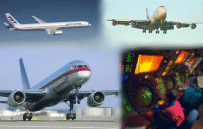

| |
|
|
|
|
|
MS/SE Concentration in
Air Transportation Systems (ATS)
 Transportation is one of the most important and increasingly complex infrastructure
networks of our modern society. The air mode of transportation has been
using radars, wireless telecommunications and a distributed communications/ computer
decision support system to control and separate aircraft since the 1950’s.
Today, the ground mode of transportation is adopting many of these same
technologies to attempt to deal with growing highway congestion. At the
same time, the air mode is attempting to radically change the traditional
forms of air traffic control to deal with growing congestion in the hub and
spoke network that comprises our modern international air transportation
system. Communications, Navigation and Surveillance (CNS) functions are
migrating from totally ground-based systems to hybrid ground and satellite
bases systems. Central control is migrating to distributed control. Airline
Air Operations Centers are taking on increased roles and responsibilities
through the use of Collaborative Decision Making (CDM). Trucking Operations
Centers are tracking their fleets with space-based systems.
Transportation is one of the most important and increasingly complex infrastructure
networks of our modern society. The air mode of transportation has been
using radars, wireless telecommunications and a distributed communications/ computer
decision support system to control and separate aircraft since the 1950’s.
Today, the ground mode of transportation is adopting many of these same
technologies to attempt to deal with growing highway congestion. At the
same time, the air mode is attempting to radically change the traditional
forms of air traffic control to deal with growing congestion in the hub and
spoke network that comprises our modern international air transportation
system. Communications, Navigation and Surveillance (CNS) functions are
migrating from totally ground-based systems to hybrid ground and satellite
bases systems. Central control is migrating to distributed control. Airline
Air Operations Centers are taking on increased roles and responsibilities
through the use of Collaborative Decision Making (CDM). Trucking Operations
Centers are tracking their fleets with space-based systems.
This emphasis looks at transportation operations, monitoring and control from a systems engineering perspective. It uses both analytical methods and complex simulations to give the student an awareness of how future transportation systems will evolve.
Basic methods course:Students must complete one course from the list of basic methods courses.
Concentration-specific courses:
Students must complete
two required courses and one elective course from an approved list. The two required courses are:
- SYST 560 Introduction to Air Traffic Control
- SYST 660 Air Transportation Systems Modeling
The list of approved elective includes all basic methods courses and the following:
- CSS 610 Agent-based Modeling and Simulation
- SYST 618 Model-based Systems Engineering
- SYST 630 Systems Engineering Management II
- SYST 671 Judgment and Choice Processing and Decision Making
- OR 647 Queuing Theory

|
| ||
|
|
|
|

| ||